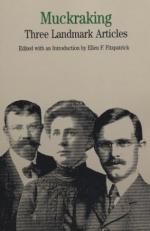|
This section contains 736 words (approx. 3 pages at 300 words per page) |

|
In 1906, his irritation with the popular press growing, President Theodore Roosevelt coined a new term for the journalists who had helped make, but were beginning to plague, his administration. As he laid the cornerstone for the new House of Representatives office building, he excoriated these "muckrakers" who refused to respect and enjoy America's turn-of-the-century prosperity, but rather "continued to rake … the filth on the floor." The term stuck, the word entered the language, and the period in American history loosely dated from 1903 to 1912, became known as "the muckraking era."
Muckraking, the investigative journalistic style pioneered by McClure's magazine and imitated by scores of American periodicals, had its roots in late-nineteenth-century scandal mongering and yellow journalism. However, it differed from its precursors in two important regards: twentieth-century muckrakers aimed their rhetorical cannons strictly at the institutions of power in contemporary society, unlike the yellow journalists of the previous century...
|
This section contains 736 words (approx. 3 pages at 300 words per page) |

|


